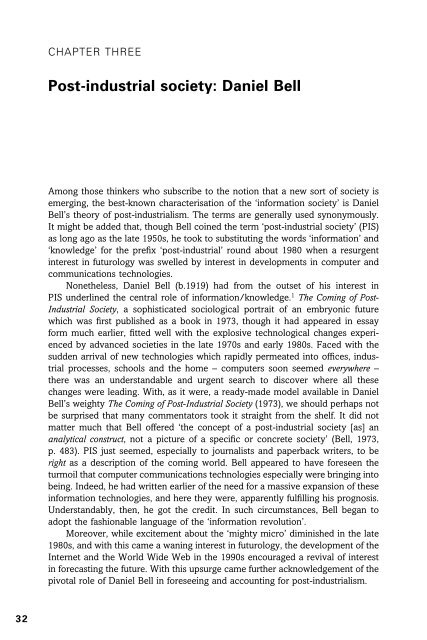Theories of the Information Society, Third Edition - Cryptome
Theories of the Information Society, Third Edition - Cryptome
Theories of the Information Society, Third Edition - Cryptome
You also want an ePaper? Increase the reach of your titles
YUMPU automatically turns print PDFs into web optimized ePapers that Google loves.
CHAPTER THREE<br />
Post-industrial society: Daniel Bell<br />
Among those thinkers who subscribe to <strong>the</strong> notion that a new sort <strong>of</strong> society is<br />
emerging, <strong>the</strong> best-known characterisation <strong>of</strong> <strong>the</strong> ‘information society’ is Daniel<br />
Bell’s <strong>the</strong>ory <strong>of</strong> post-industrialism. The terms are generally used synonymously.<br />
It might be added that, though Bell coined <strong>the</strong> term ‘post-industrial society’ (PIS)<br />
as long ago as <strong>the</strong> late 1950s, he took to substituting <strong>the</strong> words ‘information’ and<br />
‘knowledge’ for <strong>the</strong> prefix ‘post-industrial’ round about 1980 when a resurgent<br />
interest in futurology was swelled by interest in developments in computer and<br />
communications technologies.<br />
None<strong>the</strong>less, Daniel Bell (b.1919) had from <strong>the</strong> outset <strong>of</strong> his interest in<br />
PIS underlined <strong>the</strong> central role <strong>of</strong> information/knowledge. 1 The Coming <strong>of</strong> Post-<br />
Industrial <strong>Society</strong>, a sophisticated sociological portrait <strong>of</strong> an embryonic future<br />
which was first published as a book in 1973, though it had appeared in essay<br />
form much earlier, fitted well with <strong>the</strong> explosive technological changes experienced<br />
by advanced societies in <strong>the</strong> late 1970s and early 1980s. Faced with <strong>the</strong><br />
sudden arrival <strong>of</strong> new technologies which rapidly permeated into <strong>of</strong>fices, industrial<br />
processes, schools and <strong>the</strong> home – computers soon seemed everywhere –<br />
<strong>the</strong>re was an understandable and urgent search to discover where all <strong>the</strong>se<br />
changes were leading. With, as it were, a ready-made model available in Daniel<br />
Bell’s weighty The Coming <strong>of</strong> Post-Industrial <strong>Society</strong> (1973), we should perhaps not<br />
be surprised that many commentators took it straight from <strong>the</strong> shelf. It did not<br />
matter much that Bell <strong>of</strong>fered ‘<strong>the</strong> concept <strong>of</strong> a post-industrial society [as] an<br />
analytical construct, not a picture <strong>of</strong> a specific or concrete society’ (Bell, 1973,<br />
p. 483). PIS just seemed, especially to journalists and paperback writers, to be<br />
right as a description <strong>of</strong> <strong>the</strong> coming world. Bell appeared to have foreseen <strong>the</strong><br />
turmoil that computer communications technologies especially were bringing into<br />
being. Indeed, he had written earlier <strong>of</strong> <strong>the</strong> need for a massive expansion <strong>of</strong> <strong>the</strong>se<br />
information technologies, and here <strong>the</strong>y were, apparently fulfilling his prognosis.<br />
Understandably, <strong>the</strong>n, he got <strong>the</strong> credit. In such circumstances, Bell began to<br />
adopt <strong>the</strong> fashionable language <strong>of</strong> <strong>the</strong> ‘information revolution’.<br />
Moreover, while excitement about <strong>the</strong> ‘mighty micro’ diminished in <strong>the</strong> late<br />
1980s, and with this came a waning interest in futurology, <strong>the</strong> development <strong>of</strong> <strong>the</strong><br />
Internet and <strong>the</strong> World Wide Web in <strong>the</strong> 1990s encouraged a revival <strong>of</strong> interest<br />
in forecasting <strong>the</strong> future. With this upsurge came fur<strong>the</strong>r acknowledgement <strong>of</strong> <strong>the</strong><br />
pivotal role <strong>of</strong> Daniel Bell in foreseeing and accounting for post-industrialism.<br />
32
















